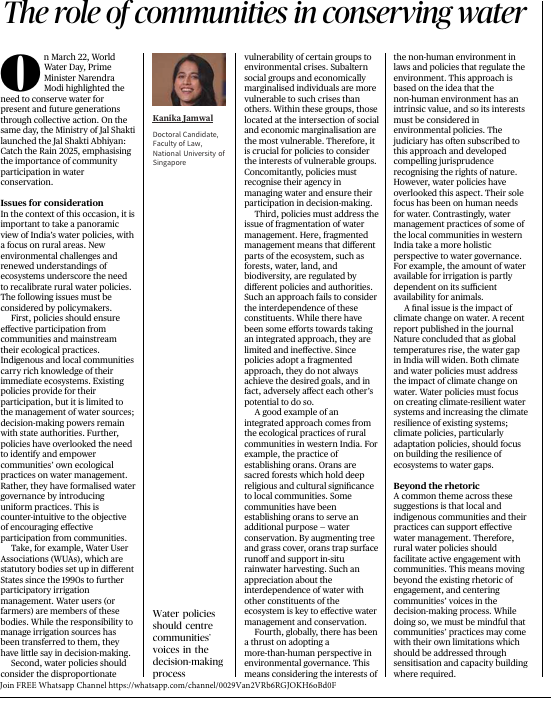The role of communities in conserving water
Source the hindu
Topic : GS1-geography , GS3 -environment
Context:
On March 22, World Water Day, PM highlighted the importance of conservation of water and emphasised the importance of community participation in water conservation.
Challenges in rural water policies:
- Water policies in rural areas need to be improved to address new environmental challenges
- The understanding of ecosystem is evolving , and policies must adapt to support sustainable water management
- The role of communities in water management:
- Indigenous and local communities have deep knowledge of their ecosystems
- While policies allow their participation ,decision making power remains with state authorities
- Instead of recognizing local water management practices ,policies introduce uniform methods that may not be suitable for all regions
- Addressing the needs of vulnerable groups:
- Some social and economic groups are more affected by water crises that others
- Within these groups , individual facing multiple layers of disadvantages are the most vulnerable
- Water policies should not only address their needs but also recognize their role in managing water resources
These groups must have an active role in decision making for effective and fair water management
- Lack of coordination in water management:
- Different aspects of the environment such as forests water land biodiversity are managed separately
- This fragmented approach leads to ineffective policies and limits conservation efforts
- An integrated approach is necessary to ensure that different environmental elements work together
- Considering nature in water policies:
- Current policies focus only on human water needs ,ignoring the importance of water for the environment
- Courts have acknowledged the rights of nature ,but water policies do not reflect this perspective
Impact of climate change on water resources:
A study published in a scientific journal highlights that rising global temperatures will widen India’s water gap .Climate and water policies should work together to create climate resilient water systems and improve existing ones.
Enhancing community involvement in water conservation:
- Local and indigenous communities can contribute significantly to water management
- Policies must move beyond just acknowledging their role and actively involve them in decision making
- While traditional practices should be encouraged any limitations should be addressed through awareness and training
Practice questions:
How can community participation and indigenous ecological practices contribute to sustainable water management in rural india? Suggest measures to enhance their role in decision making (250 words)


